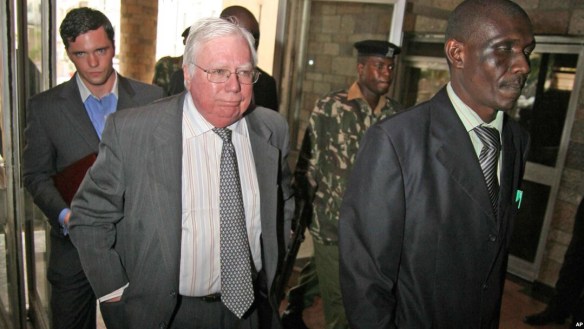-Four years ago I was just moving to Nairobi. The “Housing Bubble” was still inflated, along with the broader “Finance Bubble”. The Bush Administration had become deeply controversial and substantially unpopular, in particular because of Iraq, along with some of the whole Jack Abramoff/Tom Delay scenario in Congress that helped the Democrats retake the House in 2006.
-At that time, neither John McCain, the long time chairman of the International Republican Institute, for which I was going to work, nor Barack Obama, the young, fresh-faced green black Senator from Illinois, looked to the pundit class to be likely nominees for President. McCain had stumbled from his incumbent front-runner status, with various others seeming to emerge. Obama, obviously, needed to cap his expectations at a running mate slot if he did really well.
-It was interesting that Obama’s father had been from Kenya, and that Obama had written a memoir in part about growing up essentially without that father, but with some awareness of who he was and some communication, and then finally a visit to Kenya as a young adult. It would never, ever have occurred to me to imagine that later, many millions of Americans could imagine that Senator Obama had been born in Kenya, smuggled into the United States secretly and his story concocted as part of a vast conspiracy by someone for some purpose deeply dangerous to the country. That all these years his birth in Kenya had been known in Kenya but kept secret in the United States.
-Now that the President has gone to some lengths to make a very high profile release of the State of Hawaii’s actual “long form” certificate to supplement his previous release of a copy of his own birth certificate, the politicians who tried to advance their careers by enabling this nonsense have been damaged and the President’s re-election prospects improved.
-So why the exact timing?
It seems to me that Obama’s people would likely have assumed initially that the whole “birther thing” would die down, rather than grow, after he took office. I would have. I wouldn’t have been cynical enough about Republican politicians to realize how many would refuse to disown it or would even tacitly encourage it.
At some point it must have become clear that it should be addressed for the 2012 campaign. So why wait so long? Maybe the “rope a dope” factor. Why interrupt “silly season” among people who are obviously going to be attacking you on some basis, until the time that more independent minded people are starting to think about who to vote for next year?
The conventional wisdom in the media seems to stick with the narrative that this was a “response” to Donald Trump dictated by the traction Trump was suddenly getting through the media. Maybe, but I haven’t noticed the sourced reporting on this, as opposed to the repetition of assumption from circumstantial observation. I think this may well be wrong. Because the media seems to have had no idea about something a lot more consequential going on at the same time as the rump Trump boomlet: the preparation for the raid on the Bin Laden compound.
To me, it would seem that it was necessary for Obama to release the “long form” birth certificate to protect himself, and the country, from the kinds of things that might be said if the Bin Laden raid had failed. Jimmy Carter’s re-election was riding on the 1980 attempt to rescue American hostages in Iran–likewise the Bin Laden raid was a singular high risk event in U.S. domestic politics.
-Meanwhile, the Kenyan 2012 campaign is gearing up as well, with the ICC cases from the last election still in their early stages. Even with the birther issue behind him, I would expect that Obama will want to minimize any personal contact with Kenyan controversies until after his own election, relying on Secretary Clinton and his new ambassador, Scott Gration.
Like this:
Like Loading...




